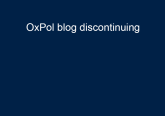‘After Years of Struggle, South Sudan Becomes a New Nation’, proclaimed a July 9, 2011 headline in The New York Times. Few headlines make such a claim nowadays. After all, the celebration of new nation is rare indeed.
Yet little good news has followed. On assignment to mark the occasion, Alex Perry, a reporter with TIME Magazine found a country of discord not development. He titled his feature: ‘Born in Blood’. This month, five years after the shouts of “Freedom” from the Southern Sudanese, and discussing a young country still marred by genocide, corruption and a stubborn civil conflict, he opted for concision over candor: South Sudan is a ‘horrible disaster’, he wrote.
Addressing a crowded lecture hall at the Oxford Martin School, Mr. Perry —whose award-winning reportage has graced the pages of TIME Magazine and Newsweek, among others— roiled the audience with tales from his years on the African continent. His dispatches, published in his latest book, The Rift: A New Africa Breaks Free, are divided by countries, featuring previous reporting and, in some instances, have been expanded, updated and sharpened for full effect.
Any book that addresses the immense continent, with its 54 countries, must strain for any claim of comprehensiveness, but Perry smartly traces tripartite trends that, he believes, continue to haunt the continent: the jihadists, dictators and —most controversially— aid workers.
“Each of these groups have a patronizing perspective on Africa,” Perry explained. At the heart of these perspective, is the “idea that civilians (whether subjects under jihadists, civilians under a dictator, or recipients of aid, respectively) cannot be trusted.”
The event’s interviewer, Matthew Stadlen, highlighted potential controversy with Perry’s perspective on aid workers. Sensitive to these concerns, Perry didn’t shy away from an unpalatable reality: When reported accounts fail to cohere to established worldviews, those facts are often jettisoned.
Perry referred to his 2011 reporting on the Somali famine, a humanitarian crisis which cost more than 250,000 lives. According to his reporting for TIME, the famine was spurned by the politics of the American government, who classified the provision of food aid as tantamount to supporting terrorism. In these, the hangover years of the global war on terror, the logic of restricting aid —if there was any— was to avoid crucial resources falling into the hands of Somali rebels. “US policy is no food or resources to southern Somalia,” an aid worker told Perry. “The famine is proof of their success.”
At its core, however, the Somali story highlights how the incentives to help are often muddled by the complexities of politics on the ground. These “nightmares” —even ones the international community seeks to confront— are “facilitated by the humanitarian impulse,” Mr. Perry said.
“The aid business is disaster,” Mr. Perry told the audience. While aid practitioners might not be consciously malign, “it is definitely in their interest to highlight [the theme of] crisis.”
Mr. Perry’s assessment of the continent is conscious of the need for nuance. After all, one of the book’s primary contentions is that countries as diverse as Mali, Democratic Republic of Congo, Niger or Angola have been defined primarily by outsiders. By granting organizations, even those with benevolent mission statements, the ‘right’ to define countries from abroad is too reminiscent of the well-trodden colonial approach, and stigmatizes regions by obscuring the diversity and strength of African agency. He calls this the “Human Rights Watch” treatment.
Mr. Perry is not the first to highlight the corrosive effects of good intentions, but his experience —both as Africa bureau chief for TIME Magazine and the years spent living across the continent— suggests that long-term aid programs have simply “taught new [African] leaders that they don’t need to care” about services critical to their people. If it is broken, someone else will fix it.
A sensitivity to duplicity underwrites many of Perry’s dispatches. In his interview, Stadlen describes these accounts as “heavy” and “harrowing.” But the unflinching questions Perry lobs at the self-described ‘well-intentioned’ are precisely where this book’s merits lie.
Why, he asks, have we looked to celebrities like George Clooney on matters of international politics and humanitarian concern in Sudan? Perry admits Clooney is clearly passionate and knowledgeable about South Sudan (they’ve met), but finds error in the logic of such populist philanthropy. Just because Clooney can raise awareness about an issue and advocate effectively for a particular resolution, does not mean that he should. “There is a gap in reasoning here,” Perry said. After all, South Sudan represents a most worrisome precedent for polity-as-handmaiden of the international community.
But Clooney, and others like him, are just one of the overlapping and complicated topics addressed in the The Rift’s 425 pages. Adjacent narratives about the senseless violence of Boko Haram (the world’s most deadly terrorist organization), are accounts of the United States’ role in birthing Al Shabaab in Somalia as well as stories from the ‘powder keg’ of impending racial conflict in South Africa.
One question from the audience, which challenged Mr. Perry on the consequences of Africa’s coming demographic growth, hinted at inevitable disaster. Larger populations would be forced to vie for already scarce economic and material resources, leading to further strife —or so the theory goes. But Perry was quick to discount the Malthusian fear. Instead, he believes demographic growth will fill the empty swathes of African land and these additional bodies will provide much needed human capital for the generations of development to come.
For some, these flashes of promise will have to suffice, as the continent, painted in Perry’s prose, leaves little space for hope to squeeze through.
Mr. Perry is not discouraged. “You don’t have wars when there isn’t something to fight over,” he assured the audience. While jihadists, dictators, and aid workers have each played a hand in defining the Africa of today, the resurgence of the African public’s “ferocious self assertion” will define the continent’s future.







